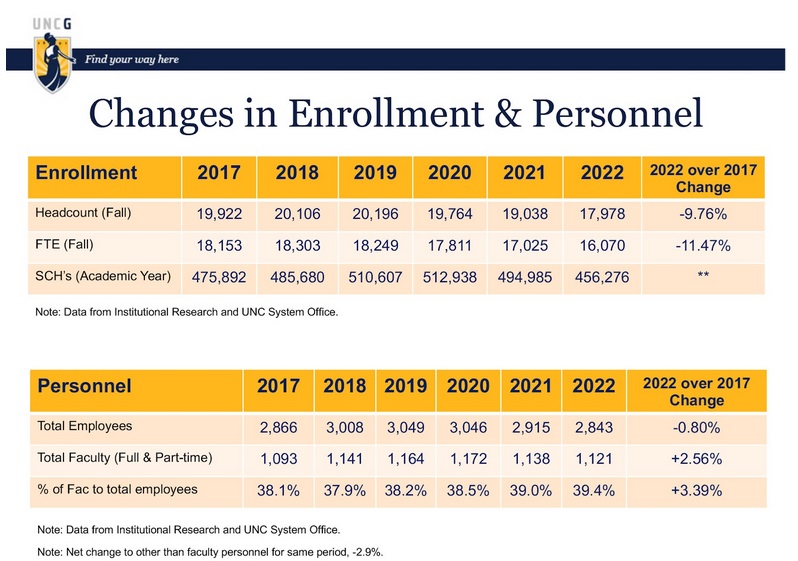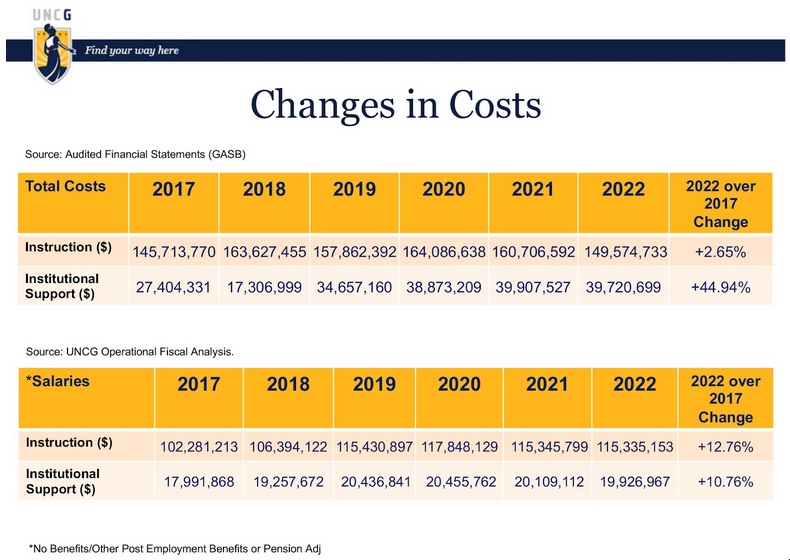A months-long saga at UNC Greensboro is coming to a close. The chancellor announced roughly four months ago that some academic offerings would be re-evaluated, and, as of February 1, 20 academic programs have hit the chopping block. The uproar throughout the process, largely from faculty, has provided a continuous news cycle of suspicion and distress and a few surprising (or perhaps unsurprising) turns of events.
During his State of the Campus address last October, Chancellor Frank Gilliam shared that an academic program review (APR) was taking place in an effort to align the institution’s offerings with “student demands and workforce needs.” Highlighting numerous measures that have negatively impacted the university’s finances (specifically the new funding model for the UNC System), as well as data showing current and predicted enrollment declines across much of higher education, Gilliam made clear that there is only so much funding available. UNCG must pivot and prioritize its most successful degree programs.
Uproar throughout the process, largely from faculty, has provided a continuous news cycle of suspicion and distress.A website detailing the university’s APR was established and began posting updates early last year. The website houses information about the “Task Force for Financial Sustainability,” which was established last February to “identify near- and long-term fiscal sustainability strategies for the institution.” Made up of both faculty and staff, the task force worked with the RPK Group to create a report cataloging its recommendations.
While it doesn’t appear that the report explicitly recommended cutting academic offerings, that has been the ultimate result, as decided by UNCG administration. Needless to say, many have not taken the news well.
The chancellor published a list of proposed cuts on January 16, with a final decision set to be made two weeks later, on February 1. One factor considered was low enrollment: The list displayed academic programs along with their current number of enrolled students, with totals varying from zero to 62. The chancellor also made clear that current students in affected programs would have the opportunity to complete their coursework as long as they remained in good academic standing.
The response to the list of potential cuts was presumably what the chancellor hoped to avoid when he asked faculty, during his original announcement, not to resist change or push back against “the headwinds” of lowered budgets and declining enrollment. In response to the announcement, the campus chapter of the American Association of University Professors (AAUP) initiated its own audit of UNCG, conducted by a single professor (rather than an accounting firm) at a peer institution. Howard Bunsis, accounting professor at Eastern Michigan University, found that UNCG was in fine shape and that, in any case, the problem was administrative bloat, not under-enrolled programs. While administrative bloat is often a concern at universities and should probably be taken into consideration by UNCG, it is also likely true, as UNCG’s chancellor retorted in a counter-statement, that the AAUP audit was “rife with major and minor inaccuracies and misinformation.”
Chancellor Gilliam’s office released data countering many claims made in the audit. “Over 85% of the University’s budget is dependent on enrollment,” Gilliam wrote. Furthermore, state appropriations are based on student enrollment (headcount) and credit hours. If enrollment continues to decline (thus bringing credit hours down with it), state funds are likely to continue to decrease in the coming years.

When one compares UNCG’s total number of employees with its total faculty count, faculty numbers show far more growth, with a +2.56-percent change between 2017 and 2022. Conversely, the university’s total employee count saw a -0.80-percent change over the same time frame.
The chancellor also pointed out that the claim made in the AAUP’s audit concerning administrative versus faculty spending was flawed. In fact, Gilliam argued, instructional salaries (+12.76 percent) increased slightly more than administrative salaries (+10.76 percent) from 2017 to 2022. [Editor’s note: The massive increase in institutional-support costs from 2018 to 2019 was due to a change in accounting practices, according to a university spokesperson.]

One of the main sticking points for faculty had to do with a rubric created by UNCG administration and RPK Group. (The rubric was made public by the news outlet Triad City Beat.)
In this rubric, UNCG’s programs were given an overall rating of either “exceeding,” “meeting,” or “approaching” expectations—or “need[ing] examination.” Faculty complaints arose from the fact that programs with scores other than “needs examination” were nevertheless listed among the proposed cuts. Many of the proposed cuts concerned programs that were scored as “meeting” or “approaching” expectations, which many (wrongly but understandably) assumed meant their program was safe.
If enrollment continues to decline, state funds are likely to decrease.If one examines the preamble of the rubric, however, one sees that the scores were not intended to be deciding factors for any program: “These scores should be understood as informative, not determinative.” The rubric was just one of many tools used to aid the administration throughout the APR process.
While academic right-sizing will obviously be difficult for those directly impacted, the reaction of many faculty highlighted a lack of consideration of the bigger picture. Knee-jerk opposition to any cuts begins to look like mere self-preservation.
To wit, the Faculty Senate voted on January 24 “to censure the Chancellor and the Provost for not initiating consultation with the Senate at the start of the APR process and not providing a clear rationale of the choice of program closures.” The motion passed in a 25-10 vote (of 39 eligible ballot-casters), and while the vote did not have the power to stop the cuts from taking place, the symbolic gesture was clear.
Despite all the ruckus and opposition, the final cuts were released on the first of this month and are detailed below:
Undergraduate Majors
• BA, Anthropology
• BA, Secondary Education in Geography
• BS and BA, Physics
• BS, Physical Education, Teacher Education (K-12)
• BA, Religious Studies (will now be a concentration within the Liberal and Professional Studies Program — see below for details)Undergraduate Minors, Certificates, and Course Offerings
• Chinese minor
• Russian minor
• Korean language coursesGraduate Programs
• Post-Baccalaureate Certificate in Nursing
• Post-Baccalaureate Certificate in Advanced Practice Foundations (Nursing)
• MA, Applied Geography
• MFA, Drama Concentration in Directing (Concentrations in Musical Direction for Musical Theatre, Theatre for Youth, and Design will continue)
• MFA, Interior Architecture
• MA, Languages, Literatures, and Cultures
• MAT, Languages, Literatures, and Cultures in Teaching
• MA, Mathematics (all concentrations)
• MEd, Special Education
• Dual Masters in Nursing Science and Business Administration (The stand-alone MBA and standalone MSN are not affected)
• PhD, Communication Sciences and Disorders
• PhD, Computational Mathematics
In addition, as the report makes clear, the dean’s recommendation that admissions be paused for the MFA in Drama – Concentration in Acting has been approved. The Joint PhD program in social work (offered with N.C. A&T) will also pause admissions—another decision aligned with UNCG’s probably wise attempt to cut more graduate programs than undergraduate ones. A spokesperson for the university confirmed to the Martin Center that some courses from eliminated undergraduate majors (e.g., physics and anthropology) will continue to be offered, as they serve as prerequisites in other programs.
Chancellor Gilliam summed up the decision by stating, “Fundamentally, this is about the future. By better aligning resources with our mission, student and community needs, and competitive demands, we ensure UNCG’s academic and financial footing for the next generation.” He is right. Decisions like these must be made in advance of financial damage. As with any business on a limited budget, time and money are most useful when you have them.
UNCG’s cuts, though disliked by those directly impacted, are a prudent move. Perhaps there is room for culling of administrative or other roles, as well. As Chancellor Gilliam urged from the beginning, universities should not be blind to the changing landscape of higher education and the influence those changes may have on enrollment and budgets. At the end of the day, it is impossible and fiscally irresponsible for every university to attempt to supply every possible academic offering at all times.
Ashlynn Warta is the state reporter for the James G. Martin Center for Academic Renewal.

